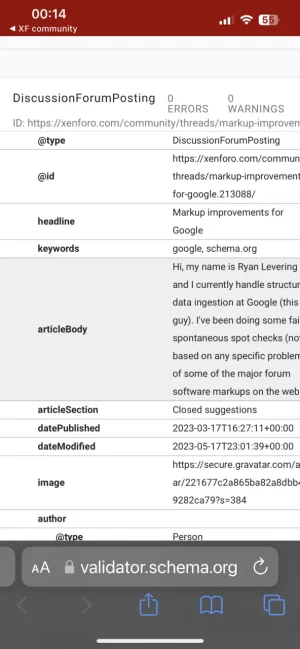rrlevering
Hi, my name is Ryan Levering and I currently handle structured data ingestion at Google (this guy). I've been doing some fairly spontaneous spot checks (not based on any specific problem) of some of the major forum software markups on the web just to see whether the markup is being generated in an ideal way for our systems to ingest. You can stick a URL in http://validator.schema.org to get an idea of what your markup for a given URL looks like. I have a couple of high-level suggestions to take or leave as you see fit:
- Include more than the OP with "http://schema.org/Comment" nodes through a "http://schema.org/comment" property. We're trying to normalize the forum markup space to use DiscussionForumPosting for the OP and attach Comment typed markup for the replies in a flat list (or threaded if you are a threaded forum). Without that, it makes it harder to segment the rest of the page appropriately in our index.
- Co-typing WebPage and DiscussionForumPosting like you do is going to confuse our ingestion a bit. If you squint it's not that inaccurate, but it would be clearer to either have WebPage (separate node) -> mainEntity -> DiscussionForumPosting or DiscussionForumPosting -> mainEntityOfPage -> WebPage (separate node). A co-typed self-cycle needs to be detected specially often.
- Include profile URLs in your author -> Person nodes. Raw names are not nearly as useful for disambiguation.
Upvote
40

